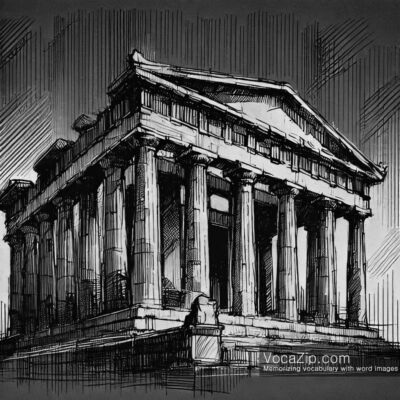ancient meaning
ancient :
Muy viejo, de tiempos pasados
Adjetivo
▪ The ancient ruins are fascinating.
▪ Las ruinas antiguas son fascinantes.
▪ Ancient traditions are still practiced.
▪ Las tradiciones antiguas aún se practican.
paraphrasing
▪ old – viejo
▪ antique – antiguo
▪ historic – histórico
▪ archaic – arcaico

ancient :
Persona de tiempos antiguos
Sustantivo
▪ The ancients built impressive structures.
▪ Los antiguos construyeron estructuras impresionantes.
▪ Legends of the ancients are intriguing.
▪ Las leyendas de los antiguos son intrigantes.
paraphrasing
▪ forefathers – antepasados
▪ ancestors – ancestros
▪ predecessors – predecesores
▪ elders – ancianos
Pronunciation
ancient [ˈeɪn.ʃənt]
El adjetivo tiene el acento en la primera sílaba "an", y se pronuncia como "éin-shent".
Common phrases and grammar about ancient
ancient - Common meaningn
Adjetivo
Muy viejo, de tiempos pasados
Sustantivo
Persona de tiempos antiguos
Part of Speech Changes for ancient
▪ antiquity (sustantivo) – antigüedad
▪ anciently (adverbio) – antiguamente
Common Expressions with ancient
▪ ancient history – historia antigua
▪ ancient civilization – civilización antigua
▪ ancient times – tiempos antiguos
▪ ancient art – arte antiguo
Important examples of ancient in TOEIC
Vocabulary examples from the TOEIC test
En las preguntas de vocabulario del TOEIC, "ancient" se utiliza principalmente para describir objetos o culturas muy viejas.
Ejemplo de palabra fácilmente confundible: antique (antiguo)
‘Antique’, por otro lado, se refiere a objetos que son valiosos debido a su edad, generalmente más de 100 años, pero no necesariamente de un pasado remoto. Usar ‘antique’ para describir civilizaciones o culturas sería incorrecto. Por lo tanto, ‘ancient’ es la opción adecuada para describir artefactos de civilizaciones antiguas.
Grammar examples from the TOEIC test
"Ancient" se utiliza como adjetivo para describir cosas que son muy viejas o de tiempos pasados.
ancient
Idioms and fixed expressions in TOEIC
"Ancient history" significa "historia antigua" y se usa para referirse a los eventos del pasado lejano.
"Ancient of days" es una expresión que se refiere a Dios en textos religiosos.
Differences between similar words and ancient
ancient
,
old
differences
"Ancient" se refiere a algo de tiempos muy pasados, mientras que "old" simplemente indica que algo ha existido durante mucho tiempo.
ancient
,
antique
differences
"Ancient" se refiere a tiempos históricos, mientras que "antique" se refiere a objetos de valor por su antigüedad.
Words with the same origin as ancient
The origin of ancient
"Ancient" proviene del latín "antiquus", que significa "viejo" o "de tiempos pasados".
Word structure
Está compuesto por la raíz "antiqu" (viejo) y el sufijo "ent" (adjetivo), por lo que "ancient" tiene la estructura de palabra que significa "de tiempos pasados".
Words with the same origin
La raíz de "ancient" es "antiqu". Palabras con la misma raíz incluyen "antique" (antiguo) y "antiquity" (antigüedad).
Please select an image in the quiz
Previous post and next post


disappointed
736
sad, let down
adjective ┃
Views 1






